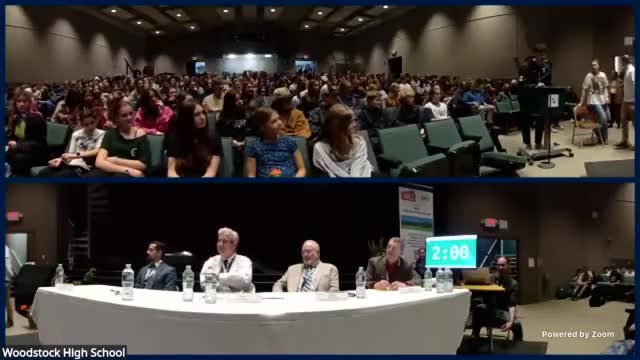Senate education committee hears pleas in Woodstock to preserve small schools, decouple construction costs and tax second homes
Get AI-powered insights, summaries, and transcripts
Subscribe
Summary
Students, teachers and residents in Woodstock urged the Vermont Senate Education Committee to protect local schools from redistricting-driven closures, decouple capital costs from per-pupil funding, and consider taxing second homeowners to help fund school construction.
WOODSTOCK, Vt. — The Vermont Senate Education Committee visited Woodstock on Nov. 18 for a listening session during which students, teachers and community members urged lawmakers not to let redistricting under Act 73 dismantle local school programs and regional hubs, and asked the state to change how it pays for school buildings.
Students at Woodstock Union Middle and High School described strong community ties and warned that longer bus rides — one student said he already travels roughly 40 minutes each way — would erode extracurricular participation and belonging. "If we change anything going forward, I want to make sure that kids are able to feel a sense of belonging and want to return to Vermont," Skyler Haga, a Woodstock senior, said.
Speakers pressed senators on whether redistricting would move teachers, alter class sizes or simply be a cost-cutting measure. "There's still a whole lot of unknowns about what redistricting will look like," Senator Nadir Hashim said, noting the redistricting task force recommended voluntary participation by communities. Several senators emphasized the process is preliminary and that implementation could take years.
Community members repeatedly asked the committee to "decouple" capital projects from operating budgets so towns could pursue building bonds without increasing per-pupil spending. The president of the Mountain View Education Association, representing about 200 staff, listed four requests including decoupling personnel from capital costs and asking the state to fund 30%–50% of school infrastructure projects.
Former school board member Paige Heller cited state funding history and local tax flows in arguing for formula reform: "Woodstock sends about $18,000 into the state education fund, and we receive about $8,000 to $9,000 back," she said. Several speakers urged lawmakers to consider new revenue sources, including higher taxes on second homeowners, to ease local tax burdens and fund construction.
Speakers also flagged equity and special education concerns. A district director of student support services said Woodstock’s district has roughly 13%–15% of students eligible for special education, while neighboring districts can have rates as high as 35%, and argued that current funding approaches penalize districts that maintain lower special-education percentages.
Committee members acknowledged the arguments but said many decisions remain for the full legislature. "The number-one priority for Act 73 is education quality," Senator Terry Williams said, adding that the Agency of Education will need to work with schools to ensure an equitable curriculum and that funding should follow needs. Chair Seth Bongard told the audience the committee will continue collecting input ahead of the January session.
Several residents also urged lawmakers to weigh travel times, safety and environmental impacts of longer commutes. One parent pointed to steep winter driving conditions on Killington roads as a safety concern if students were routed to more distant schools.
The visit produced no formal votes or policy changes; senators characterized the day as part of an information-gathering tour of five schools. Lawmakers said the committee will review testimony, continue outreach and consider funding and redistricting options when the legislature reconvenes.
What’s next: the committee returns to formal session in January; senators urged residents to submit written testimony and continue local outreach to shape redistricting proposals and options for capital funding.
